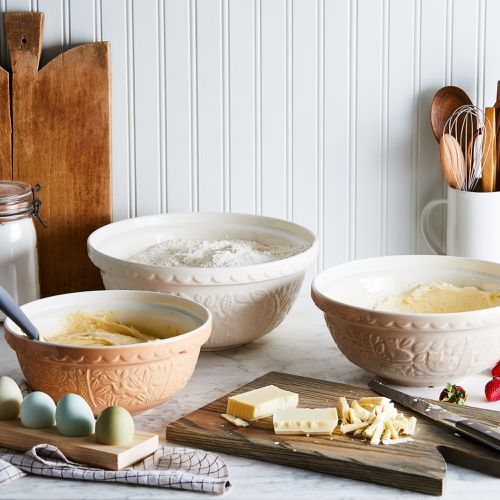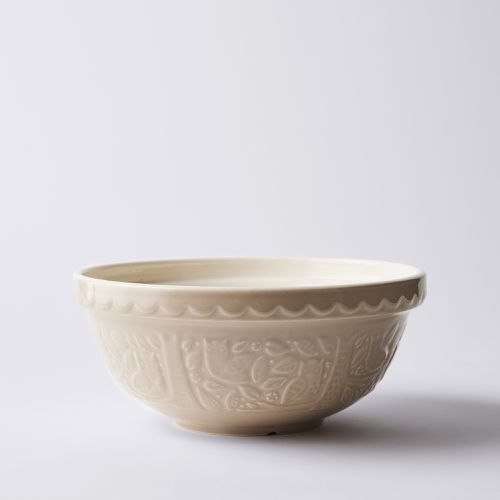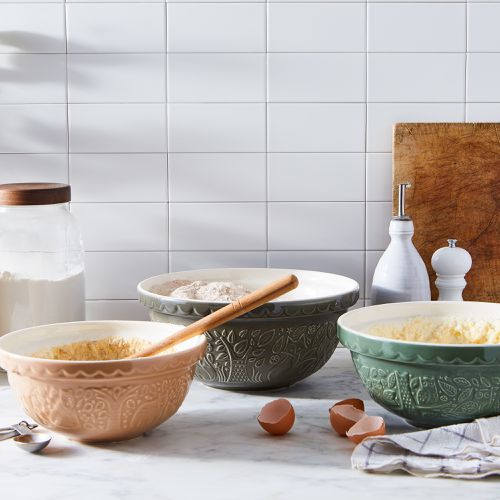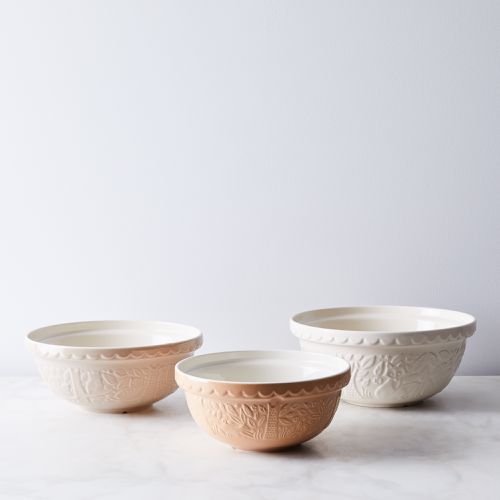



Mason Cash
Mason Cash In the Forest Mixing Bowl Set
4.1 Stars /
Sorry, this item is no longer available.
Meet the Maker
Mason Cash
United Kingdom
England-based Mason Cash has been in the kitchenware business for over 200 years, and it’s easy to see why: Their iconic mixing bowls (recognize ‘em from the Great British Bake Off?) are chip-resistant, can sail through the microwave and dishwasher, and have charmingly embossed patterns that add extra grip for high-speed whisking. No wonder they’re beloved by so many home chefs and professionals on both sides of the pond.
View Full Profile
A Similar Style
Error loading product
Error loading product
Error loading product
Error loading product
Error loading product
Error loading product
Error loading product
Error loading product
Error loading product
Error loading product
Error loading product
Error loading product
Error loading product
Error loading product
Error loading product
4.1
4.1 star rating
4.1 star rating 18 Reviews Thank you for posting a question!
Please click on the link in the confirmation email we just sent you to submit your question.
Your question will appear on the site once someone answers it.
Your question will appear on the site once someone answers it.
- REVIEWS
- QUESTIONS
Filter Reviews
More Filters
FILTERS Clear All
Rating
Reviews
Show 18 Reviews
Rating
- All
- 5.0 star rating
- 4.0 star rating
- 3.0 star rating
- 2.0 star rating
- 1.0 star rating
Images & Videos
Clear All
18 Reviews
Sort: Select
Updating Results
D
Deborah M.
Verified Buyer
1.0 star rating
12/31/22
Broken
Review by Deborah M. on 31 Dec 2022 review stating Broken
Piece was broken, and it was not due to a damaged box. It was due to poor packaging. Not a good experience for a first time buy.


On Mason Cash In the Forest Mixing Bowl Set (Small)
share ' Share Review by Deborah M. on 31 Dec 2022 facebook facebook Share Review by Deborah M. on 31 Dec 2022 twitter twitter Share Review by Deborah M. on 31 Dec 2022 LinkedIn linkedin Share Review by Deborah M. on 31 Dec 2022 Comments (1)
12/31/22
Reviewed on: Mason Cash In the Forest Mixing Bowl Set (Medium)
Was this review helpful? 3 0
Comments by Store Owner on Review by Deborah M. on 31 Dec 2022
Food52
01/12/23
We're so sorry for the delayed reply, and that your set arrived damaged. I see that someone from our Care team has already been in touch to get this resolved!
01/12/23
S
Stephanie D.
Verified Buyer
5.0 star rating
12/11/23
Very pleased
Review by Stephanie D. on 11 Dec 2023 review stating Very pleased
I love the size of this bowl and it is so pretty on a shelf too!
On Mason Cash In the Forest Mixing Bowl Set (Small)
share ' Share Review by Stephanie D. on 11 Dec 2023 facebook facebook Share Review by Stephanie D. on 11 Dec 2023 twitter twitter Share Review by Stephanie D. on 11 Dec 2023 LinkedIn linkedin Share Review by Stephanie D. on 11 Dec 2023
12/11/23
Reviewed on: Mason Cash In the Forest Mixing Bowl Set (Medium)
Was this review helpful? 0 0
E
Ellis G.
Verified Buyer
5.0 star rating
07/01/23
Beautiful
Review by Ellis G. on 1 Jul 2023 review stating Beautiful
This mixing bowl is a beauty. It sits on the counter—too pretty to put away. It is large—just what I was hoping for!
On Mason Cash In the Forest Mixing Bowl Set (Small)
M
Myrrh B.
Verified Buyer
5.0 star rating
06/30/23
Strong, surprisingly lightweight, and delightful
Review by Myrrh B. on 30 Jun 2023 review stating Strong, surprisingly lightweight, and delightful
Add a little whimsy and magic to your kitchen. This bowl is delightfully light for its size making it a dream to use.
On Mason Cash In the Forest Mixing Bowl Set (Small)
E
Elise H.
Verified Buyer
5.0 star rating
05/13/23
A very pretty set of bowls
Review by Elise H. on 13 May 2023 review stating A very pretty set of bowls
These bowls are so nice. Colors looks so nice together and size of bowls is great for working with.
On Mason Cash In the Forest Mixing Bowl Set (Small)
B
Bridget H.
Verified Buyer
5.0 star rating
05/01/23
Beautiful bowl
Review by Bridget H. on 1 May 2023 review stating Beautiful bowl
I absolutely love this bowl. It’s functional, whimsical, and will be passed down to my grandchild. If, for some reason it is broken, it will go back to the earth in harmony.
On Mason Cash In the Forest Mixing Bowl Set (Small)
C
Carrie S.
Verified Buyer
5.0 star rating
10/18/22
The best mixing bowl!
Review by Carrie S. on 18 Oct 2022 review stating The best mixing bowl!
I absolutely love this mixing bowl! Feels solid but at the same time it’s not too heavy. The large size is great for a couple loaves of bread or a double batch of scones. And the design is too cute!
On Mason Cash In the Forest Mixing Bowl Set (Small)
M
Mary T.
Verified Buyer
5.0 star rating
04/17/22
Superior Quality
Review by Mary T. on 17 Apr 2022 review stating Superior Quality
I have other Mason Cash bowls so I already knew how beautiful and functional it would be. The color is a perfect neutral, i can use it on the table with many different colors and patterns. The only criticism I have is that it arrived in a box that is 16 x16 x16 inches, with a huge amount of bubble wrap. It seems wasteful, and I will try to reuse i...Read MoreRead more about I have other Mason Cash bowls so I
t all, but really, it could have been sent in a box half that size. Not Food 52 nor Mason Cash’s fault, but someone should consider this amount of waste. Thank you for asking! Otherwise, always a “10” experience with Food 52! Read LessRead less about I have other Mason Cash bowls so I
On Mason Cash In the Forest Mixing Bowl Set (Small)
share ' Share Review by Mary T. on 17 Apr 2022 facebook facebook Share Review by Mary T. on 17 Apr 2022 twitter twitter Share Review by Mary T. on 17 Apr 2022 LinkedIn linkedin Share Review by Mary T. on 17 Apr 2022
04/17/22
Reviewed on: Mason Cash In the Forest Mixing Bowl Set (Medium)
Was this review helpful? 1 0
E
Elizabeth A.
Verified Buyer
5.0 star rating
07/18/21
Great mixing bowl set
Review by Elizabeth A. on 18 Jul 2021 review stating Great mixing bowl set
I love my new Mason Cash set of mixing bowls! They are generously sized, but relatively light weight. Easy clean up in the dishwasher. And the designs are lovely. Thanks Food52 for offering such a beautiful, quality product.
On Mason Cash In the Forest Mixing Bowl Set (Small)
V
Vickie
Verified Buyer
5.0 star rating
07/08/20
Love the Forest motif
Review by Vickie on 8 Jul 2020 review stating Love the Forest motif
I bought these for my daughter and she loves the bowls!
I had also purchased the canisters but were not happy with quality - upon further investigation- they were made in China. I will be purchasing the set of 4 small bowls for her, as these are made in Portugal as well as the larger bowls.
Thank you Food52 for posting where each product i...Read MoreRead more about I bought these for my daughter and she
I had also purchased the canisters but were not happy with quality - upon further investigation- they were made in China. I will be purchasing the set of 4 small bowls for her, as these are made in Portugal as well as the larger bowls.
Thank you Food52 for posting where each product i...Read MoreRead more about I bought these for my daughter and she
s made! Read LessRead less about I bought these for my daughter and she
On Mason Cash In the Forest Mixing Bowl Set (Small)
share ' Share Review by Vickie on 8 Jul 2020 facebook facebook Share Review by Vickie on 8 Jul 2020 twitter twitter Share Review by Vickie on 8 Jul 2020 LinkedIn linkedin Share Review by Vickie on 8 Jul 2020
07/08/20
Reviewed on: Mason Cash In the Forest Mixing Bowl Set (Medium)
Was this review helpful? 2 0
Our Tips & Stories
How we'd use this beauty in our own homes.

Our 15 Most Popular Cake Recipes of All Time
The cakes we love to make.

What to Make With Sourdough Starter (Besides Bread)
Save that discard for cookies, crackers, waffles, and even dog treats. Here’s how to put that bubbly gold to use.

The Best Vanilla Extract Substitute Is Probably Hiding in Your Kitchen
Lookin' at you, cake batter.



